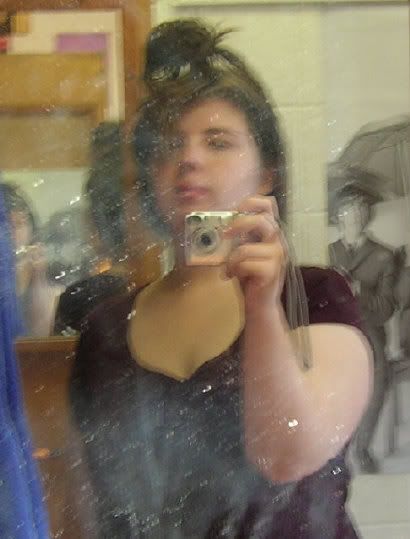夜の窓辺
Okay, so I'm slightly infatuated with the internal rhyme in this line right now and I feel compelled to share: So picture the following syllables said sort of fast and staccato-y, with silent beats indicated by x's:
yo ru no ma x do be de ka no jo wa x hi to ri
So the internal rhyme I'm referring to is that between "no ma" and "jo wa" (the two things right before the pauses). But I love it because here's how the word breaks in the line go (with gloss):
Yoru no madobe de kanojo wa hitori...
night 's window-near at she TOP alone
So the rhyming elements are the possessive particle plus the first syllable of "window", and the last syllable of "she" plus the topic particle. I love that! Why is it so satisfying? Something about the mismatch between the phonetic connections and the syntactic/morphological connections is deeply compelling. That's so often true. Why?
I think our minds enjoy being forced to deal with things that are in some ways dissonant or contradictory. Like enjambment, or synethesia (umm, meaning describing something with the wrong sense -- not the actual neurological condition), or unexpected metaphors, or stuff I've talked about before where songs play with your expectations and desire to hear a certain rhythm, or transition, or chord, or internal rhyme like this that creates parallels between syllables that are not otherwise semantically or syntactically parallel in any way.
Sigh. So good.
夜の窓辺で 彼女は一人
星に向けて 歌を唄ってる
「私は一体 何がしたいんだろう?」
不安と共に 煙草をくわえた
yo ru no ma x do be de ka no jo wa x hi to ri
So the internal rhyme I'm referring to is that between "no ma" and "jo wa" (the two things right before the pauses). But I love it because here's how the word breaks in the line go (with gloss):
Yoru no madobe de kanojo wa hitori...
night 's window-near at she TOP alone
So the rhyming elements are the possessive particle plus the first syllable of "window", and the last syllable of "she" plus the topic particle. I love that! Why is it so satisfying? Something about the mismatch between the phonetic connections and the syntactic/morphological connections is deeply compelling. That's so often true. Why?
I think our minds enjoy being forced to deal with things that are in some ways dissonant or contradictory. Like enjambment, or synethesia (umm, meaning describing something with the wrong sense -- not the actual neurological condition), or unexpected metaphors, or stuff I've talked about before where songs play with your expectations and desire to hear a certain rhythm, or transition, or chord, or internal rhyme like this that creates parallels between syllables that are not otherwise semantically or syntactically parallel in any way.
Sigh. So good.
星に向けて 歌を唄ってる
「私は一体 何がしたいんだろう?」
不安と共に 煙草をくわえた


0 Comments:
Post a Comment
<< Home